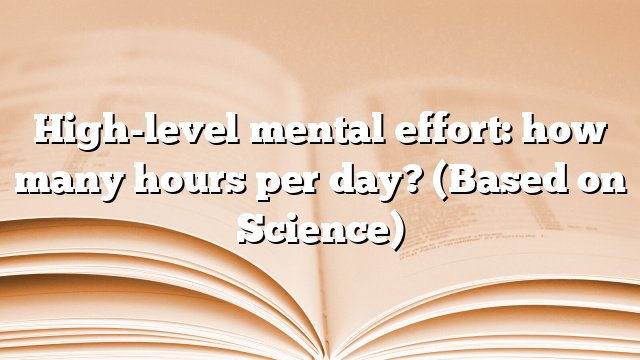
High-level mental effort: how many hours per day? (Based on Science)
The number of hours per day an individual can perform high mental effort varies widely based on factors like personal stamina, the nature of the tasks, and the work environment.
Generally, research suggests that the average person can maintain high mental effort for about 4-6 hours per day.
Beyond this, mental fatigue tends to set in, reducing productivity and cognitive performance. This duration can be extended with proper breaks, a healthy lifestyle, and effective time management strategies.
Research suggests that the average person can sustain high mental effort for about 4-6 hours per day. For example, studies on cognitive performance and fatigue indicate that beyond this period, mental fatigue increases, reducing productivity and cognitive efficiency. The concept of mental fatigue is well-documented in cognitive psychology, with evidence showing that extended periods of high cognitive demand lead to decreased attention and performance. Additionally, individual differences, task complexity, and the presence of breaks can influence this duration.
For a more detailed analysis, see:
- Kanfer, R. & Ackerman, P.L. (1989). “Motivation and cognitive abilities: An integrative/aptitude-treatment interaction approach to skill acquisition.”
- Kahneman, D. (1973). “Attention and Effort.”
Here are some key studies and concepts regarding high mental effort and cognitive fatigue:
- Kahneman’s Attention and Effort: Daniel Kahneman’s research highlights that mental effort is finite and prolonged tasks requiring high cognitive load lead to mental fatigue.
- Kanfer and Ackerman’s Integrative Approach: Their work integrates motivation and cognitive abilities, emphasizing that performance declines after extended periods of high cognitive demand due to fatigue.
- Ericsson, Krampe, and Tesch-Römer’s Deliberate Practice: Their study on expert performance suggests that sustained mental effort (like deliberate practice) is most effective in sessions of no more than 4-5 hours a day.
- Baumeister’s Ego Depletion Theory: This theory suggests that self-control and cognitive exertion draw from a limited pool of mental resources that deplete over time, reducing performance in prolonged tasks.
These studies collectively suggest that 4-6 hours of high mental effort per day is a practical limit for most individuals.